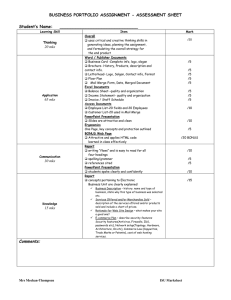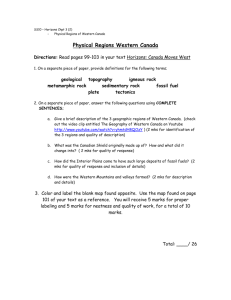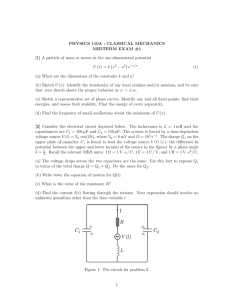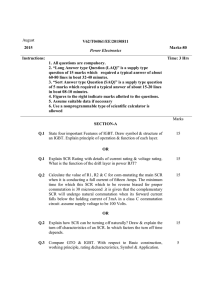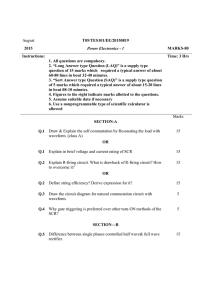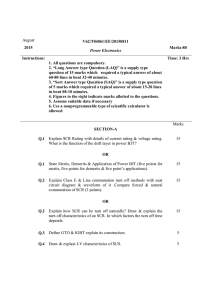Power Electronics(PEL)
advertisement
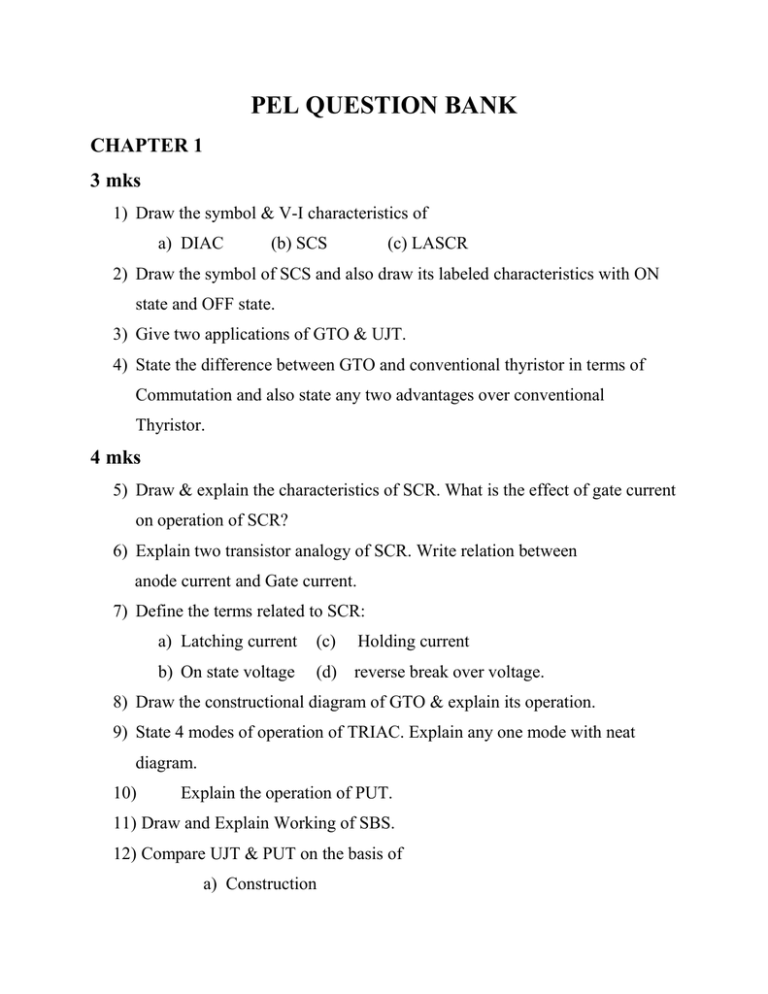
PEL QUESTION BANK CHAPTER 1 3 mks 1) Draw the symbol & V-I characteristics of a) DIAC (b) SCS (c) LASCR 2) Draw the symbol of SCS and also draw its labeled characteristics with ON state and OFF state. 3) Give two applications of GTO & UJT. 4) State the difference between GTO and conventional thyristor in terms of Commutation and also state any two advantages over conventional Thyristor. 4 mks 5) Draw & explain the characteristics of SCR. What is the effect of gate current on operation of SCR? 6) Explain two transistor analogy of SCR. Write relation between anode current and Gate current. 7) Define the terms related to SCR: a) Latching current (c) Holding current b) On state voltage (d) reverse break over voltage. 8) Draw the constructional diagram of GTO & explain its operation. 9) State 4 modes of operation of TRIAC. Explain any one mode with neat diagram. 10) Explain the operation of PUT. 11) Draw and Explain Working of SBS. 12) Compare UJT & PUT on the basis of a) Construction b) Symbol c) Working Principle d) Applications. 13) Explain the operation of DIAC. CHAPTER 2 3 mks 1) Define commutation. State the types of commutation. 2) What is the need of isolation in pulse transformer in triggering circuits and give its two applications. 3) Draw Turn off characteristics of SCR. Define reverse recovery time. 4) List out triggering methods for SCR. Which method is mostly preferred? 4 mks 5) Explain dv/dt triggering method of SCR. 6) Show the effect of resistance variations on firing & conduction angle with waveform in RC triggering. 7) Explain the working of resistance triggering with neat waveforms. 8) Draw the circuit diagram of UJT relaxation oscillator and write the expression for frequency. 9) Draw & explain the operation of PUT relaxation oscillator. 10) Draw class A commutation circuit with its neat waveform. 11) Draw the circuit diagram of Class B commutation. State the function of each commutating components. 12) Draw and explain the circuit diagram of Class C commutation. PEL Question Bank (17444) Unit Test 2 (2013-14) CHAPTER 1 (10 mks) 3 MKS 1) State the phenomenon of breakdown in NPN power transistor with proper output characteristics. 2) State any three advantages of IGBT. 4 MKS 3) State different operating regions of power transistor. What is primary and secondary breakdown? 4) Draw the labeled constructional diagram of N channel IGBT. 5) Compare power transistor & power MOSFET with respect to a. symbol b. switching speed c. SiO2 layer d. On state losses e. Application CHAPTER 4 (24 mks) 3 MKS 6) Define any two performance parameter of inverter. 7) Define chopper &State its classification. 8) Define inverter and classify it. 4 MKS 9) Draw circuit diagram of step up chopper and why it is called as step up? 10) Draw single phase half bridge inverter with R load & State its operation. 11) Show the effect of change of duty cycle on the output voltage of chopper with proper waveforms. CHAPTER 5 (14 mks) 3 MKS 12) Why germanium is not suitable for control rectification ? 13) State the need of polyphase rectifier. 4 MKS 14) Differentiate controlled & Uncontrolled rectifier with respect to device used, firing circuit, phase angle control & applications. 15) Draw the circuit diagram and input & output voltage waveforms of 3Φ half wave rectifier with resistive load. 16) Draw single phase center tapped controlled rectifier with resistive load and its load voltage waveform. 17) Draw the neat circuit diagram of single phase half wave controlled rectifier with RL load & describe its working. State the effect of freewheeling diode with suitable waveforms in controlled rectifier. 18) A single phase Full wave controlled rectifier is supplied with a voltage V= 230Sin (314t) find average output DC voltage and current if firing angle is 45degrees & load resistance is 100Ω. CHAPTER 6 (16 mks) 3 MKS 19) Draw labeled circuit of Electronic timer using SCR. 20) Draw labeled basic block diagram of UPS. 4 MKS 21) Draw the temperature controller using SCR. Explain How temperature is controlled? 22) Draw the circuit of speed control of fan using TRIAC. Why DIAC is used ? 23) Draw the labeled circuit diagram of battery charger using SCR. 24) Draw circuit diagram & write the working of emergency light system. 25) Draw block diagram of SMPS & describe its working.
